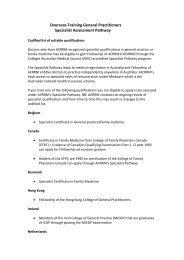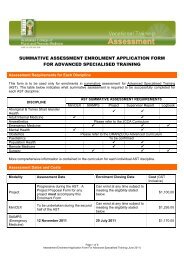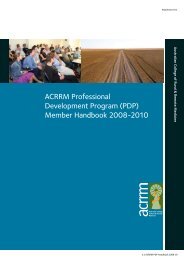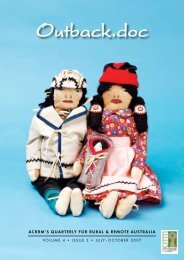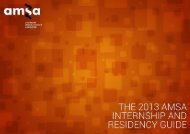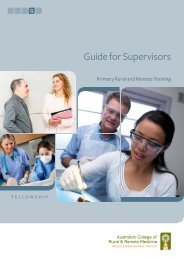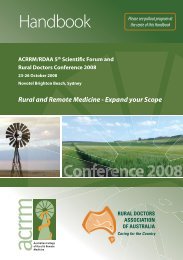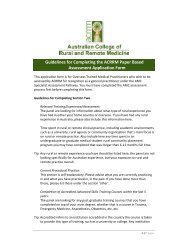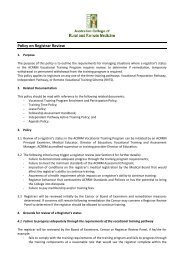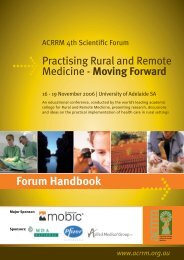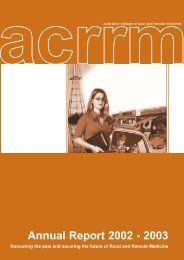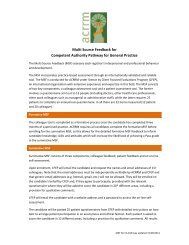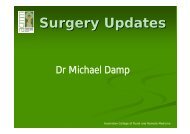Mental Health - Australian College of Rural and Remote Medicine
Mental Health - Australian College of Rural and Remote Medicine
Mental Health - Australian College of Rural and Remote Medicine
You also want an ePaper? Increase the reach of your titles
YUMPU automatically turns print PDFs into web optimized ePapers that Google loves.
Contact details<strong>Australian</strong> <strong>College</strong> <strong>of</strong> <strong>Rural</strong> <strong>and</strong> <strong>Remote</strong> <strong>Medicine</strong>GPO Box 2507Brisbane QLD 4001Telephone 07 3105 8200 Email training@acrrm.org.auFax 07 3105 8299 Website www.acrrm.org.auCopyright© <strong>Australian</strong> <strong>College</strong> <strong>of</strong> <strong>Rural</strong> <strong>and</strong> <strong>Remote</strong> <strong>Medicine</strong> 2011. All rights reserved. No part <strong>of</strong> thisdocument may be reproduced by any means or in any form without express permission inwriting from the <strong>Australian</strong> <strong>College</strong> <strong>of</strong> <strong>Rural</strong> <strong>and</strong> <strong>Remote</strong> <strong>Medicine</strong>.Version: 01/111
AcknowledgementsACRRM thanks the following people for their time <strong>and</strong> expertise in the development <strong>of</strong> thiscurriculum:• Pr<strong>of</strong> Ge<strong>of</strong>f Riley – Principal writer – Head <strong>of</strong> School, the <strong>Rural</strong> Clinical School <strong>of</strong> WesternAustralia• Dr Siva Bala – Regional Psychiatrist, Kimberley <strong>Mental</strong> <strong>Health</strong> <strong>and</strong> Drug Service, WA• Dr Paul Corrigan – Consultant Psychiatrist, Bunbury Community <strong>Mental</strong> <strong>Health</strong> Service,WA• Dr Mike Eaton – General Practitioner, Coast Road Medical Clinic, Crooked Brook, WA• Dr Jenny Gunn – Urban Medical Educator, Adelaide to Outback, SA• Dr Jeremy Hayllar – Clinical Director, Alcohol <strong>and</strong> Drug Service, Metro North <strong>Health</strong>Service, QLD• Ms Debbie Hamilton – Consumer <strong>and</strong> Carer Advocate• Ms Lynette Hinge – Consumer <strong>and</strong> Carer Advocate• Dr Rol<strong>and</strong> Main – Visiting Consultant Psychiatrist, Pilbara <strong>Mental</strong> <strong>Health</strong> <strong>and</strong> DrugService, WA• Dr Stephen Proud – Psychiatrist, West Perth, WA• Dr Louise Stone – Senior Medical Advisor, GPET, Canberra, ACT.2
Table <strong>of</strong> ContentsAcknowledgements………………………………………………………………………………... 21. Background……………………………………………………………………………………… 52. Purpose <strong>and</strong> Requirements…………………………………………………………………….52.1 Purpose……………………………………………………………………………………. 52.2 Target group………………………………………………………………………………. 52.3 Duration……………………………………………………………………………………. 52.4 Potential posts…………………………………………………………………………….. 52.5 Prerequisites………………………………………………………………………………. 63. Rationale………………………………………………………………………………………….64. Learning Outcomes……………………………………………………………………………...74.1 Domain 1. Core clinical knowledge <strong>and</strong> skills…………………………………………. 74.1.1 History taking……………………………………………………………………… 74.1.2 <strong>Mental</strong> state examination………………………………………………………… 74.1.3 <strong>Mental</strong> health diagnosis………………………………………………………….. 84.1.4 <strong>Mental</strong> health management planning……………………………………………84.1.5 Pharmacotherapy………………………………………………………………….84.1.6 Counselling <strong>and</strong> psychosocial therapy…………………………………………. 94.1.7 Follow-up <strong>and</strong> long-term care…………………………………………………… 94.1.8 Carer support……………………………………………………………………… 94.1.9 <strong>Mental</strong> health services <strong>and</strong> resources………………………………………....104.2 Domain 2. Extended clinical practice………………………………………………….. 104.2.1 St<strong>and</strong>ardised assessment tools……………………………………………….. 104.2.2 Child <strong>and</strong> adolescent mental health……………………………………………104.2.3 Forensic mental health…………………………………………………………. 104.2.4 Referral <strong>and</strong> transfer……………………………………………………………. 104.3 Domain 3. Emergency care……………………………………………………………. 104.3.1 Psychiatric crisis management………………………………………………… 104.3.2 Initial assessment <strong>and</strong> stabilisation……………………………………………1114.3.3 Emergency pharmacotherapy…………………………………………………. 114.3.4 Referral <strong>and</strong> transfer……………………………………………………………. 114.4 Domain 4. Population health…………………………………………………………… 114.4.1 Community mental health needs………………………………………………. 114.4.2 Community mental health programs………………………………………….. 114.5 Domain 5. Aboriginal <strong>and</strong> Torres Strait Isl<strong>and</strong>er <strong>Health</strong>……………………………..1224.5.1 Cultural competence…………………………………………………………….1223
4.5.2 <strong>Mental</strong> health attitudes, beliefs <strong>and</strong> customs………………………………… 124.5.2 Cross-cultural communication skills…………………………………………… 124.5.3 Barriers to mental health care services………………………………………..124.6 Domain 6. Pr<strong>of</strong>essional, legal <strong>and</strong> ethical practice………………………………….. 124.6.1 Legal <strong>and</strong> ethical practice……………………………………………………….124.6.2 Pr<strong>of</strong>essional boundaries………………………………………………………... 124.6.3 Life-long learning………………………………………………………………... 124.6.4 Quality assurance……………………………………………………………….. 134.6.5 Staff training……………………………………………………………………...134.6.5 Self care………………………………………………………………………….. 134.7 Domain 7. <strong>Rural</strong> <strong>and</strong> remote context…………………………………………………. 134.7.1 Nature <strong>of</strong> rural <strong>and</strong> remote settings…………………………………………… 134.7.2 <strong>Mental</strong> health issues in rural <strong>and</strong> remote areas……………………………… 135. Teaching <strong>and</strong> Learning Approaches………………………………………………………… 136. Supervision <strong>and</strong> Support……………………………………………………………………... 147. Assessment……………………………………………………………………………………. 147.1 <strong>Mental</strong> health supervisor feedback reports…………………………………………… 147.2 <strong>Mental</strong> health project…………………………………………………………………….157.3 <strong>Mental</strong> health miniCEX…………………………………………………………………. 158. Useful Resources………………………………………………………………………………169. Evaluation……………………………………………………………………………………… 16References……………………………………………………………………………………….. 164
1. BackgroundCompletion <strong>of</strong> a minimum 12 months Advanced Specialised Training is an essentialcomponent <strong>of</strong> training towards ACRRM Fellowship. Registrars can select from ten advancedtraining areas which reflect rural <strong>and</strong> remote clinical practice needs.<strong>Mental</strong> health is a particular priority due to the major burden <strong>of</strong> mental illness in rural <strong>and</strong>remote communities, combined with the scarcity <strong>of</strong> specialist mental health services in theseregions. For these reasons, rural <strong>and</strong> remote general practitioners <strong>of</strong>ten provide vital frontline<strong>and</strong> extended mental health care services.This Advanced Specialised Training Curriculum sets out the advanced competenciesrequired upon completion <strong>of</strong> an Advanced Specialised Training year in mental health. Thesecompetencies are additional to the mental health skills <strong>and</strong> other training laid out in theprimary curriculum. The basic knowledge <strong>and</strong> skills described in the Primary Curriculum areassumed as prior or concurrent learning <strong>and</strong> are not re-stated in this AST curriculum.2. Purpose <strong>and</strong> Requirements2.1 PurposeThe purpose <strong>of</strong> this curriculum is to assist in delivery <strong>of</strong> mental health services in rural <strong>and</strong>remote communities by fostering advanced mental health training among rural <strong>and</strong> remotegeneral practice registrars.2.2 Target groupThis curriculum targets ACRRM registrars who are undertaking an Advanced SpecialisedTraining (AST) year in mental health. An AST in mental health would be appropriate for anyACRRM registrar with an interest in mental health.2.3 DurationAdvanced Specialised Training in mental health requires a minimum 12 months full time orequivalent part time training. The training program will take into account other pr<strong>of</strong>essional,personal <strong>and</strong> family needs <strong>and</strong> will <strong>of</strong>fer the flexibility for individuals to undertake thistraining on a part-time basis or in two or more blocks. Registrars who choose these optionswill not be disadvantaged. Subject to prior approval by the ACRRM censor, registrars mayrequest to undertake up to 6 months <strong>of</strong> this training in one or two sub-specialty areas.2.4 Potential postsTraining for the Advanced Specialised Training year in mental health may be undertakenacross one or more posts. An appropriate post or combination <strong>of</strong> posts must beprospectively approved by ACRRM.Appropriate posts would have the following features:• able to <strong>of</strong>fer appropriate supervision by a specialist psychologist, psychiatrist or GP withan appropriate skill set, subject to approval by ACRRM• able to <strong>of</strong>fer a suitable range <strong>and</strong> depth <strong>of</strong> mental health learning opportunities• able to <strong>of</strong>fer opportunities for acquisition <strong>and</strong> practise <strong>of</strong> appropriate skills• focus on skills acquisition5
The following features would be highly desirable:• rural or remote setting• dedicated psychiatric facility• supervision from a GP with the appropriate skill set• supervision from a psychiatristTo achieve the curriculum outcomes, it may be necessary for a registrar to split his/hertraining between more than one post: It may also be necessary to undertake one or moreshort-term secondments to learn specific skills.2.5 PrerequisitesPrior to undertaking this post, registrars must meet the following criteria:• satisfactory completion <strong>of</strong> the Core Clinical Training component <strong>of</strong> ACRRM Fellowshiptraining• satisfactory completion <strong>of</strong> a minimum <strong>of</strong> one term in mental health• satisfactory completion <strong>of</strong> an ACRRM-approved GPMHSC Level 2 <strong>Mental</strong> <strong>Health</strong> Skillscourse (pre- or co-requisite).• satisfactory completion <strong>of</strong> the ACRRM “Introduction to Population <strong>Health</strong>” onlinelearning module at www.rrmeo.com (pre- or co-requisite).3. Rationale<strong>Mental</strong> health is a priority area for rural <strong>and</strong> remote general practitioners due to:• the high incidence <strong>of</strong> mental health conditions in rural <strong>and</strong> remote areas• the high morbidity <strong>and</strong> mortality associated with mental health conditions• the different case-mix <strong>of</strong> mental health conditions in rural <strong>and</strong> remote areas• the specific challenges <strong>of</strong> mental health care delivery in rural <strong>and</strong> remote settings.The famous WHO-sponsored international study “<strong>Mental</strong> Illness in General Practice” foundthat <strong>Mental</strong> health presentations are very common in general practice, with up to 30% <strong>of</strong> allGP presentations involving an underlying or co-morbid mental health condition. 1 Thisseminal study <strong>of</strong> mental illness in primary care concluded that “contrary to the widely heldbelief that mental disorders seen in general practice are <strong>of</strong> minor significance, they are amajor public health problem <strong>and</strong> cause a great burden on individuals, their families, healthcare services <strong>and</strong> society”. Subsequent major studies internationally <strong>and</strong> in Australia haveconfirmed <strong>and</strong> extended these findings particularly in respect <strong>of</strong> the extent <strong>of</strong> the morbidity<strong>and</strong> disability involved. 2,3<strong>Mental</strong> <strong>Health</strong> morbidity is high in rural <strong>and</strong> remote areas <strong>and</strong> the patterns may vary fromurban practice. 4 Aspects <strong>of</strong> mental health care delivery in rural <strong>and</strong> remote regions alsodiffer, or differ in emphasis, from that in urban areas. These include:• distance to specialist treatment <strong>and</strong> the consequent variation <strong>of</strong> treatment algorithms• shared care concepts – local mental health teams <strong>and</strong> mental health nurses used a lotmore – teamwork very important• dynamics <strong>of</strong> small communities – confidentiality, trust <strong>and</strong> stigma• fluctuating demographics in rural/remote settings• pr<strong>of</strong>essional isolation.This curriculum has been developed with these factors in mind.6
4. Learning OutcomesThe domains <strong>of</strong> rural <strong>and</strong> remote medical practice have been defined by ACRRM <strong>and</strong>provide a framework for organising the learning outcomes for this curriculum. The domainsare:1. Core clinical knowledge <strong>and</strong> skills2. Extended clinical practice3. Emergency care4. Population health5. Aboriginal <strong>and</strong> Torres Strait Isl<strong>and</strong>er health6. Pr<strong>of</strong>essional, legal <strong>and</strong> ethical practice7. <strong>Rural</strong> <strong>and</strong> remote context.As you read the following learning outcomes, your attention is drawn to the specified level <strong>of</strong>achievement for each outcome – e.g. ‘demonstrate awareness’, ‘demonstrateunderst<strong>and</strong>ing’, ‘demonstrate competence <strong>and</strong> experience’, ‘demonstrate high-level skills’.These levels <strong>of</strong> achievement differentiate the requirements <strong>of</strong> this curriculum from those <strong>of</strong>the mental health component <strong>of</strong> the ACRRM Primary Curriculum.4.1 Domain 1. Core clinical knowledge <strong>and</strong> skills4.1.1 History takingThe registrar will demonstrate high-level skills in mental health history taking, including:• awareness <strong>of</strong> history taking as the first process in engagement <strong>and</strong> management• considering the community, family <strong>and</strong> social context• taking a collateral history – family, carers, other witnesses, police, ambulance <strong>of</strong>ficersetc.• taking a focussed history in complex or difficult situations, such as:− co-morbidity – including physical illness, persistent pain or substance dependence− alcohol <strong>and</strong> other drug history− domestic violence history− previous childhood sexual abuse – managing disclosure− gambling− Aboriginal communities – grief / stolen generation effects in families− risk assessment – suicide, deliberate self-harm, harm to others− rape victims <strong>and</strong> abused women− survivors <strong>of</strong> child abuse.4.1.2 <strong>Mental</strong> state examinationThe registrar will demonstrate high-level skills in mental state examination, including:• assessment <strong>of</strong> phenomenology• assessment <strong>of</strong> affect• cognitive assessment• assessment <strong>of</strong> insight.7
4.1.3 <strong>Mental</strong> health diagnosisThe registrar will demonstrate high-level skills in mental health diagnosis, including:• underst<strong>and</strong>ing multi-axial diagnostic systems <strong>and</strong> dual diagnosis conditions, includingphysical co-morbidities, patients with persistent pain, <strong>and</strong> co-morbid substance use• underst<strong>and</strong>ing <strong>and</strong> identifying the various forms <strong>of</strong> help-seeking behaviour includingabnormal illness behaviour <strong>and</strong> manipulative behaviour• experience <strong>and</strong> competence diagnosing common mental health conditions, including:− adjustment disorders− depression – minor <strong>and</strong> major− anxiety disorders – generalised anxiety disorder, phobic disorders, obsessivecompulsive disorder, panic disorder / agoraphobia− sleep disorders− somatisation− personality disorders− psychogeriatrics – dementia, depression, delirium− substance use disorders <strong>and</strong> related behaviours – including alcohol,nicotine/tobacco, prescription opioids, <strong>and</strong> illicit drugs− ADD/ADHD in children <strong>and</strong> adolescents• ability to recognise uncommon but serious mental health conditions, such as:− psychoses – affective psychoses, schizophrenia, schizo-affective disorder,delusional disorder− eating disorders− severe somat<strong>of</strong>orm disorders− toxic <strong>and</strong> organic brain syndromes− acute stress disorder <strong>and</strong> post traumatic stress disorder (PTSD)− ADD/ADHD in adults.4.1.4 <strong>Mental</strong> health management planningThe registrar will demonstrate competence <strong>and</strong> experience in negotiating appropriatemanagement plans, including:• applying relevant clinical practice guidelines• involving patients <strong>and</strong> carers in management decisions• working as part <strong>of</strong> a multidisciplinary team• management <strong>of</strong> physical <strong>and</strong> other co-morbidities• ensuring continuity <strong>of</strong> care throughout the treatment program.4.1.5 PharmacotherapyThe registrar will demonstrate underst<strong>and</strong>ing <strong>of</strong> the principles <strong>of</strong> safe <strong>and</strong> effectivepharmacotherapy, including:• patient education• patient adherence strategies <strong>and</strong> monitoring• requirements for informed consent.The registrar will demonstrate rational mental health prescribing skills, including:• independent experience <strong>and</strong> competence in appropriate use <strong>and</strong> monitoring <strong>of</strong>:− antidepressants8
4.1.9 <strong>Mental</strong> health services <strong>and</strong> resourcesThe registrar will demonstrate skilful <strong>and</strong> appropriate use <strong>of</strong> external services <strong>and</strong> resourcesavailable to assist in management <strong>of</strong> mental health conditions, including:• opportunities for shared care• specialist services• tele-psychiatry• carer <strong>and</strong> self-help organisations• advocacy services• online services <strong>and</strong> resources.4.2 Domain 2. Extended clinical practice4.2.1 St<strong>and</strong>ardised assessment toolsThe registrar will demonstrate competence <strong>and</strong> experience in appropriate selection <strong>and</strong> use<strong>of</strong> st<strong>and</strong>ardised assessment tools.4.2.2 Child <strong>and</strong> adolescent mental healthThe registrar will demonstrate competence <strong>and</strong> experience in diagnosing <strong>and</strong> managingmoderately complex child <strong>and</strong> adolescent mental health presentations, including:• recognising the relevance <strong>of</strong> developmental stage on mental health• underst<strong>and</strong>ing the importance <strong>of</strong> family issues/dysfunction <strong>and</strong> the broader socialcontext.4.2.3 Forensic mental healthThe registrar will demonstrate the following forensic mental health skills:• initial response to cases <strong>of</strong> suspected abuse – including child abuse, domestic abuse<strong>and</strong> sexual assault• mental health assessment <strong>of</strong> <strong>of</strong>fenders• assessment <strong>of</strong> competence to consent <strong>and</strong> fitness to plead.4.2.4 Referral <strong>and</strong> transferThe registrar will demonstrate competence <strong>and</strong> experience in appropriate referral <strong>and</strong>transfer <strong>of</strong> patients with difficult or complex mental health conditions.4.3 Domain 3. Emergency care4.3.1 Psychiatric crisis managementThe registrar will demonstrate the ability to competently manage psychiatric emergencies,including:• situational crises• deliberate self-harm• acute psychoses• toxic confusional states• acute withdrawal states• severe behavioural disturbance.10
4.3.2 Initial assessment <strong>and</strong> stabilisationThe registrar will demonstrate the ability to conduct initial assessment <strong>and</strong> stabilisation <strong>of</strong> apatient experiencing a psychiatric emergency. This includes:• conducting a situational assessment <strong>and</strong> providing for safe initial containment• taking a focussed history• conducting a mental state examination <strong>and</strong> risk assessment• determining the need for emergency restraint or involuntary referral• conducting crisis counselling• providing appropriate initial pharmacotherapy.4.3.3 Emergency pharmacotherapyThe registrar will demonstrate the ability to competently <strong>and</strong> appropriately administeremergency pharmacotherapy, including:• underst<strong>and</strong>ing clinical practice guidelines• underst<strong>and</strong>ing the legal requirements for involuntary administration <strong>of</strong> emergencypharmacotherapy.4.3.4 Referral <strong>and</strong> transferThe registrar will demonstrate the ability to competently <strong>and</strong> appropriately refer <strong>and</strong> transferpatients for psychiatric care, including:• determining need for referral <strong>and</strong> transfer• underst<strong>and</strong>ing the legal <strong>and</strong> ethical requirements for involuntary referral <strong>and</strong> transfer• delivering treatment during transfer• being familiar with the Royal Flying Doctor Service or equivalent jurisdictional guidelinesfor restraint• communicating appropriately with the receiving hospital.4.4 Domain 4. Population health4.4.1 Community mental health needsThe registrar will demonstrate the ability to identify the social determinants <strong>of</strong> mental health<strong>and</strong> determine mental health needs in his/her local community. This would requirecompletion <strong>of</strong> the “Introduction to population health” online learning module atwww.rrmeo.com.4.4.2 Community mental health programsThe registrar will demonstrate competence <strong>and</strong> experience in designing <strong>and</strong> implementing acommunity mental health initiative. For example:• mental health literacy education• adolescent mental health programs• preventive programs – e.g. Beyond Blue, Headspace or GP Network mental healthactivities within the registrar’s community.11
4.5 Domain 5. Aboriginal <strong>and</strong> Torres Strait Isl<strong>and</strong>er <strong>Health</strong>4.5.1 Cultural competenceThe registrar will demonstrate cultural competence in management <strong>of</strong> mental healthpresentations.4.5.2 <strong>Mental</strong> health attitudes, beliefs <strong>and</strong> customsThe registrar will demonstrate awareness <strong>of</strong> local Indigenous attitudes, beliefs <strong>and</strong> customsrelating to mental health symptoms <strong>and</strong> treatment. This includes:• awareness <strong>of</strong> traditional practices• flexibility regarding traditional healing practices vs. biomedical treatments.4.5.2 Cross-cultural communication skillsThe registrar will demonstrate the ability to communicate with Indigenous communitymembers in a culturally appropriate <strong>and</strong> medically effective manner regarding mental healthproblems <strong>and</strong> their management.4.5.3 Barriers to mental health care servicesThe registrar will discuss the barriers to mental health care <strong>and</strong> services for Indigenouspeople in the community, such as:• access to mental health services• poor mental health literacy• alienation by culturally inappropriate mental health services• overt or structural racial discrimination• health impact <strong>of</strong> dispossession• administrative issues, such as entitlement cards <strong>and</strong> transport policies.4.6 Domain 6. Pr<strong>of</strong>essional, legal <strong>and</strong> ethical practice4.6.1 Legal <strong>and</strong> ethical practiceThe registrar will demonstrate adherence to the relevant legislative <strong>and</strong> ethical requirementsgoverning mental health practice. In particular:• patient confidentiality• competence <strong>and</strong> consent• reporting requirements – particularly m<strong>and</strong>atory reporting• commitment <strong>and</strong> involuntary treatment• involuntary transportation• involuntary treatment in the community without hospitalization• drug-affected people <strong>and</strong> manipulative drug-seeking.4.6.2 Pr<strong>of</strong>essional boundariesThe registrar will demonstrate an underst<strong>and</strong>ing <strong>of</strong> the particular importance <strong>of</strong> pr<strong>of</strong>essionalboundaries in rural <strong>and</strong> remote mental health practice <strong>and</strong> demonstrate appropriateapplication <strong>of</strong> these boundaries.4.6.3 Life-long learningThe registrar will demonstrate a commitment to life-long learning in mental health.12
4.6.4 Quality assuranceThe registrar will demonstrate a commitment to <strong>and</strong> ability to conduct quality assuranceactivities in mental health including:• clinical audit• establishment <strong>and</strong> maintenance <strong>of</strong> appropriate quality systems <strong>and</strong> procedures• supervision <strong>and</strong> peer review.4.6.5 Staff trainingThe registrar will discuss appropriate strategies <strong>and</strong> techniques for teaching mental healthapproaches to junior doctors <strong>and</strong> other health pr<strong>of</strong>essionals.4.6.5 Self careThe registrar will recognise the need to establish a peer support network <strong>and</strong> to utilise thisnetwork to debrief in times <strong>of</strong> personal or pr<strong>of</strong>essional stress.4.7 Domain 7. <strong>Rural</strong> <strong>and</strong> remote context4.7.1 Nature <strong>of</strong> rural <strong>and</strong> remote settingsThe registrar will underst<strong>and</strong> the implication <strong>of</strong> rural <strong>and</strong> remote settings for mental healthpractice, including:• mental health epidemiology <strong>of</strong> rural <strong>and</strong> remote regions• impact <strong>of</strong> stigma on help-seeking, presentation patterns <strong>and</strong> adherence to care• implications <strong>of</strong> isolation <strong>and</strong> lack <strong>of</strong> access to mental health resources.4.7.2 <strong>Mental</strong> health issues in rural <strong>and</strong> remote areasThe registrar will be able to discuss the nature <strong>and</strong> management <strong>of</strong> mental health issues inrural/remote areas. For example:• suicide in farmers• indigenous mental health• drug/alcohol issues• fly-in fly-out workers.5. Teaching <strong>and</strong> Learning ApproachesThe emphasis for Advanced Specialised Training in mental health will be on acquisition <strong>of</strong>relevant clinical experience <strong>and</strong> skills.Teaching approaches will include, but are not limited to:• Clinical experience based learning – The majority <strong>of</strong> teaching <strong>and</strong> learning should takea case based experiential format. This is the most valuable approach to learningspecific clinical skills.• Small group tutorials – These may be face-to-face, via videoconference or using onlinetele-tutorial technology.• Face to face education meetings – These may be linked with regional training providers,undertaken by teleconference or video conference, or opportunistically through relevantconferences.• Distance learning modes – These are available via the internet, using <strong>Rural</strong> <strong>and</strong><strong>Remote</strong> Medical Education Online (RRMEO) <strong>and</strong> other sources.13
6. Supervision <strong>and</strong> SupportAppropriate supervision <strong>and</strong> support arrangements are particularly important for registrarsundertaking their Advanced Specialised Training in mental health. This will involve specificmedical, cultural, pr<strong>of</strong>essional <strong>and</strong> personal support <strong>and</strong> supervision.This will include:1. Primary supervisor – a local ACRRM accredited clinical supervisor who may, or may not,work in the same organisation as the registrar <strong>and</strong> assists with the clinical aspects <strong>of</strong> theregistrar’s practice. The supervisor should be a rural doctor who can put specialistinformation into community-based context.2. Specialist supervisor – a psychiatrist or other mental health specialist who will supportthe primary supervisor <strong>and</strong> who may contribute to development <strong>of</strong> the registrar’s learningplans.3. Mentor – a person who is working, or has worked in a similar situation, <strong>and</strong> who providespastoral care <strong>and</strong> opportunities to debrief or act as a sounding board about cultural orpersonal issues. This may be the same person as the primary supervisor.7. AssessmentThe assessments required for Advanced Specialised Training in mental health are additionalto the assessments undertaken for Core Clinical Training <strong>and</strong> Primary <strong>Rural</strong> <strong>and</strong> <strong>Remote</strong>Training.Registrars undertaking Advanced Specialised Training in mental health are required tocomplete the following additional formative <strong>and</strong> summative assessment tasks.Formative tasks:• Formative mental health supervisor feedback reports – at 6 months• Formative mental health mini Clinical Evaluation Exercise (miniCEX) – minimum 5mental health consultations• Formative mental health project – a substantial project approximately 1500–2000 wordsin length or equivalent amount <strong>of</strong> work, fulfilling the criteria outlined below. The projectmust be submitted to ACRRM to demonstrate satisfactory completion.Summative tasks:• Summative mental health supervisor feedback reports – at 12 months• Summative mental health mini Clinical Evaluation Exercise (miniCEX) – 9 mental healthconsultations7.1 <strong>Mental</strong> health supervisor feedback reportsThe registrar’s supervisor will complete feedback reports half way through the training term(i.e. 6 months for a full-time registrar) <strong>and</strong> again at the completion <strong>of</strong> the training term (i.e. 12months for a full-time registrar). The first feedback report will be completed as a formativeactivity to guide further registrar learning <strong>and</strong> development. The second feedback report willbe a summative exercise used to determine the registrar’s competence.These reports are a collation <strong>of</strong> the feedback from staff that have supervised or workedalongside the registrar during the period <strong>of</strong> training. Feedback will be obtained from at leasttwo consultants or colleagues, including the registrar’s supervisor. It is the responsibility <strong>of</strong>the supervisor to obtain <strong>and</strong> this information <strong>and</strong> send to the <strong>College</strong>.14
7.2 <strong>Mental</strong> health projectThe mental health project is a formative task designed to guide the registrar’s learning. Thetopic <strong>and</strong> format <strong>of</strong> the project must be prospectively approved by the registrar’s supervisor<strong>and</strong> medical educator. The completed project must be submitted to ACRRM to demonstratesatisfactory completion.The project must:• address key learning objectives from the mental health AST curriculum• demonstrate the registrar’s ‘in depth’ underst<strong>and</strong>ing <strong>of</strong> the mental health issue(s)involved including the relevant literature• explore issues relevant to population health, Aboriginal <strong>and</strong> Torres Strait Isl<strong>and</strong>er health,pr<strong>of</strong>essional, legal <strong>and</strong> ethical practice, <strong>and</strong> the rural <strong>and</strong> remote context (i.e. domains 4to 7)• include a piece <strong>of</strong> written work.The options for this project include but are not limited to:• a set <strong>of</strong> 3 case commentaries, each 500–700 words in length, each discussing acomplex case encountered by the registrar, <strong>and</strong> each dealing with a different clinicalcontent area• development <strong>of</strong> a funding or accreditation submission• a clinical audit <strong>of</strong> practice against protocols,• a research project• submission <strong>and</strong> acceptance <strong>of</strong> an article for publication in a peer-reviewed journal• a poster presentation or PowerPoint presentation.7.3 <strong>Mental</strong> health miniCEXThe mental health mini Clinical Evaluation Exercise (miniCEX) is a practice-basedassessment where a medical practitioner observes the registrar in his/her regular practiceenvironment with his/her regular patients.The formative miniCEX is to guide the registrar’s learning <strong>and</strong> the summative exercise is toassess the registrar’s clinical competence. The formative miniCEX can be performed by thesupervisor or other medical practitioner <strong>and</strong> requires observation <strong>and</strong> feedback on aminimum <strong>of</strong> five patient consultations. The summative miniCEX is undertaken by an ACRRMappointed examiner. The examiner observes nine patient consultations <strong>and</strong> rates theregistrar against six competencies:1. communication skills2. history taking3. physical examination4. clinical judgment/clinical management5. rural <strong>and</strong> remote context/organisation/efficiency6. overall clinical competence.The registrar must also meet m<strong>and</strong>atory requirements for history taking <strong>and</strong> physicalexaminations.15
8. Useful Resources• <strong>Rural</strong> <strong>and</strong> <strong>Remote</strong> Medical Education Online (RRMEO) – www.rrmeo.org.au• Oxford Textbook <strong>of</strong> Psychiatry• John Davies. A Manual <strong>of</strong> <strong>Mental</strong> <strong>Health</strong> Care in General Practice – also online atwww.health.gov.au/internet/main/publishing.nsf/Content/mental-pubs-m-mangp-toc• https://www.ontrack.org.au/web/ontrack/programs – consumer self-managementprograms.• www.cci.health.wa.gov.au/resources/doctors.cfm – CBT resources• www.beyondblue.org.au/index.aspx – consumer support <strong>and</strong> information• www.youthbeyondblue.com – youth-focussed consumer support <strong>and</strong> information• www.ehub.anu.edu.au – a collection <strong>of</strong> consumer self-help resources, pr<strong>of</strong>essionalresources, <strong>and</strong> research information• www.sane.org – particularly useful for patient information• www.headspace.org.au – consumer information <strong>and</strong> resources.9. EvaluationThe Advanced Specialised Training curriculum in mental health will be evaluated on anongoing basis using both qualitative <strong>and</strong> quantitative methods. All stakeholders involved inthe process will be asked to provide feedback regarding the content, feasibility, rigor <strong>and</strong>outcomes in preparing doctors to take on these roles. Stakeholders will include registrars,supervisors, employers, medical educators from the regional training providers <strong>and</strong> otherswho may have been involved such as <strong>Rural</strong> Workforce Agencies, the <strong>Remote</strong> VocationalTraining Scheme, universities <strong>and</strong> health service providers. The information gathered will becollated by ACRRM <strong>and</strong> will feed into a 3-5 yearly review <strong>of</strong> the curriculum.References1. Usten TB & Sartorius N (Eds). <strong>Mental</strong> illness in general health care: An international study(1995). Wiley: Chichester2. Lopez AD, Mathers CD, Ezzati M, Jamison DT, Murray CJ. Global <strong>and</strong> regional burden <strong>of</strong>disease <strong>and</strong> risk factors, 2001: Systematic analysis <strong>of</strong> population health data. Lancet 2006;367(9524): 1747-57.3. Lawrence D, Holman CDJ, Jablensky AV (2001) Preventable Physical Illness in Peoplewith <strong>Mental</strong> Illness. Perth: The University <strong>of</strong> Western Australia. Available atwww.dph.uwa.edu.au4. Kelly BJ, Stain HJ, Coleman C et al. <strong>Mental</strong> health <strong>and</strong> well-being within ruralcommunities: The <strong>Australian</strong> rural mental health study. Aust J <strong>Rural</strong> <strong>Health</strong> 2010; 18(1): 16-24.16
Level 4, 410 Queen StreetBrisbane Q 4000email: acrrm@acrrm.org.auwebsite: www.acrrm.org.auphone: +61 7 3105 8200fax: +61 7 3105 8299




